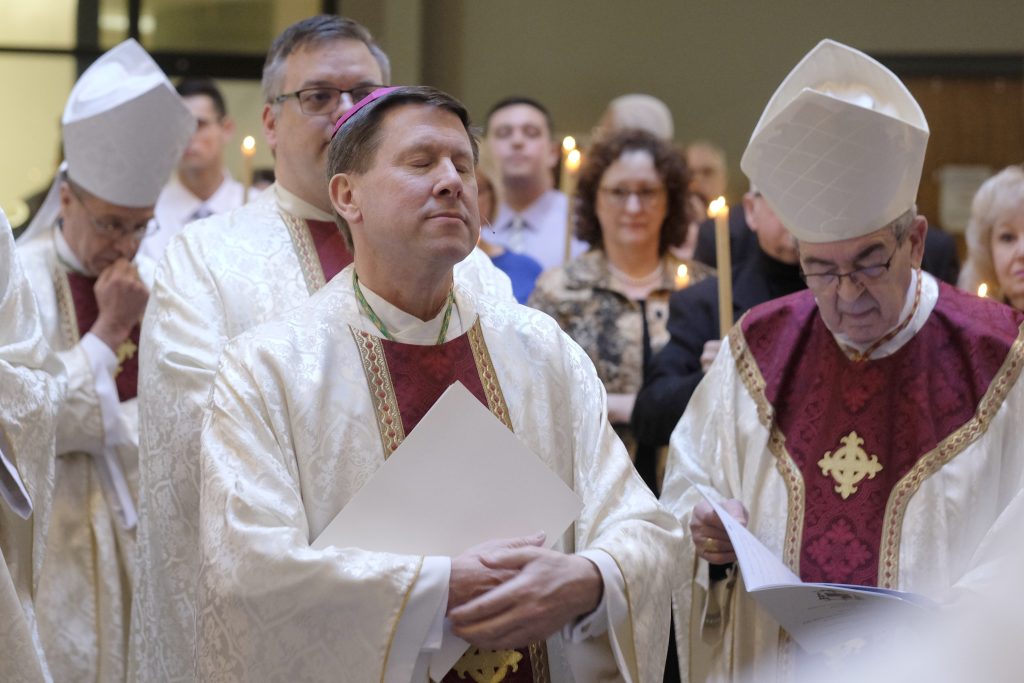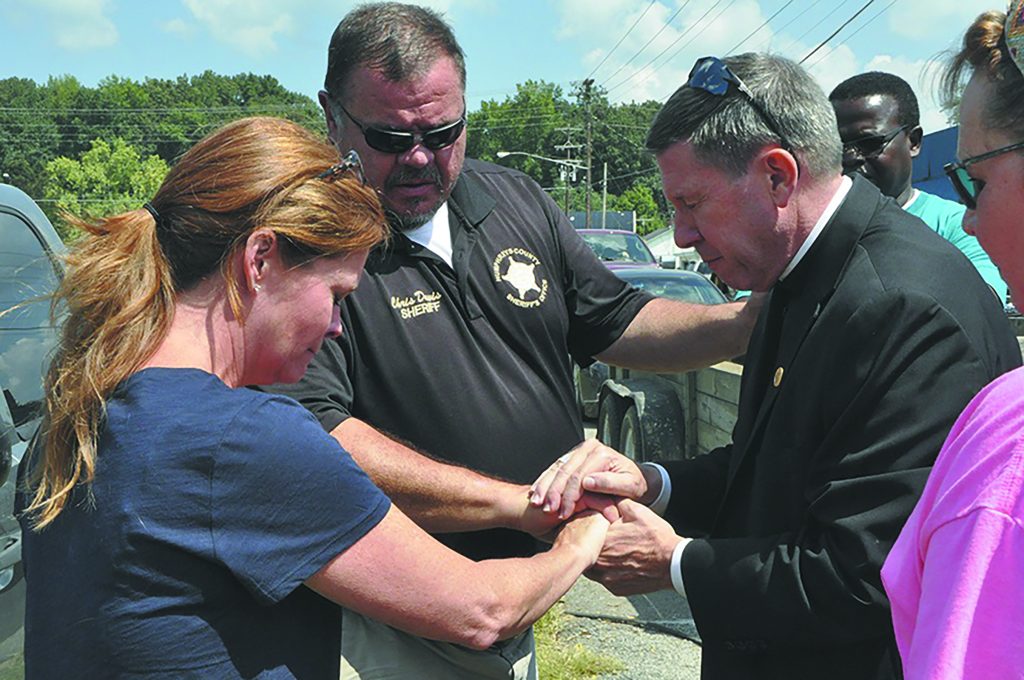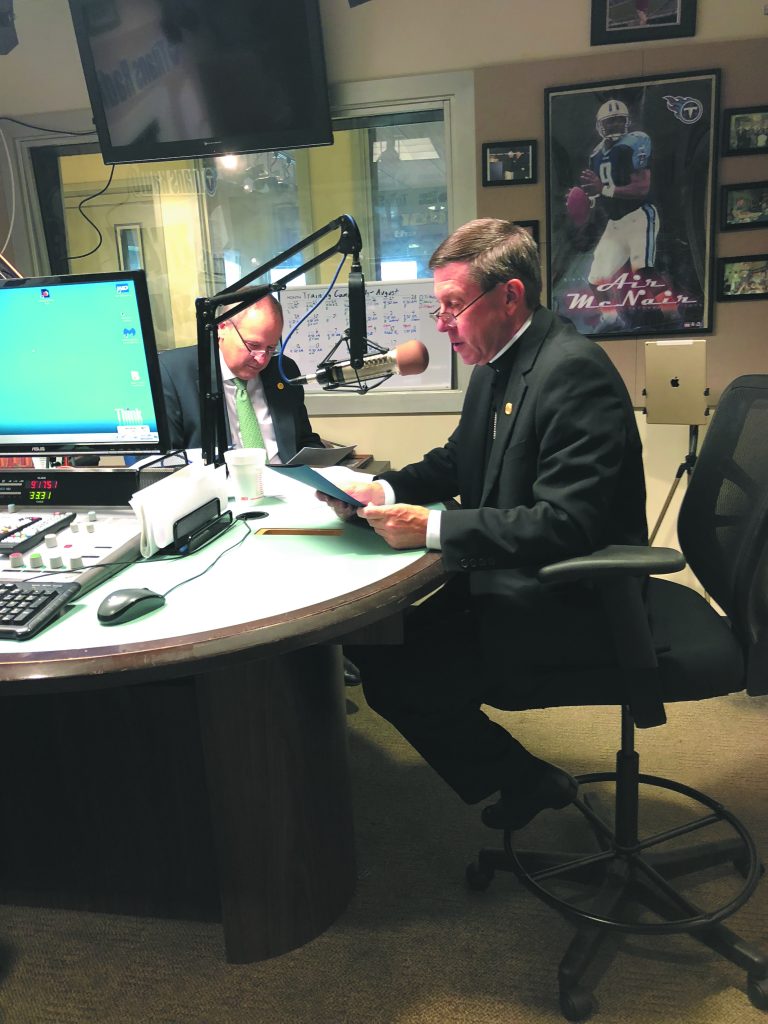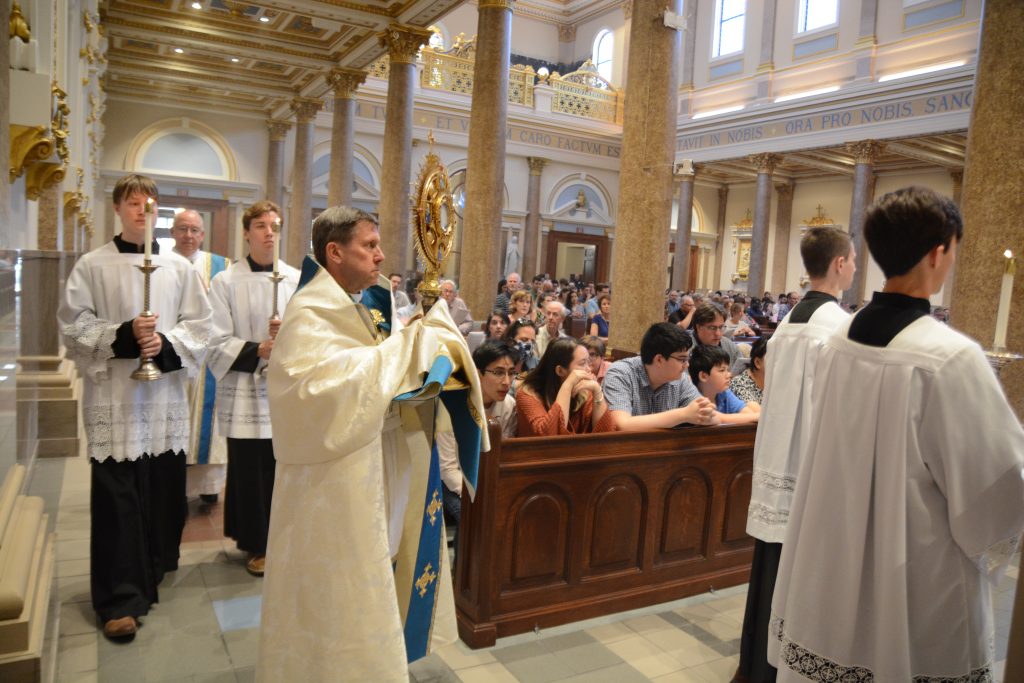
When Bishop J. Mark Spalding was installed as the 12th bishop of the Diocese of Nashville on Feb. 2, 2018, he summed up his vision of the Church with the phrase, “The love of Jesus in my heart.”
“If we have the love of Jesus in our hearts, we must pray that it ever increases,” he said that day. “Because when we have the love of Jesus in our hearts, our eyes open up, our ears open up, our arms open up, our hands open up to others. We see others, and we lift them up, and we walk with them, we build God’s kingdom here on earth.”
“Pray to God that the love of Jesus ever increases in your heart,” he said. “If you do that, not only, I believe, do you save yourself, but you help save others. And that is what the Church is all about.”
As he marks the fifth anniversary of his episcopal ordination and installation, that vision endures. “Some of the things I said at that moment is what I want to see continue in the next five years, an ever increasing of the love of Jesus in our hearts,” Bishop Spalding said.
“If you have that, all other things fall into place,” he said. “It helps us in the joys and gives us strength and encouragement during the challenges. The love of Jesus is in my heart, and may it ever increase. I think the calling of all of us as disciples of Jesus is to ever increase our love for Him. And if we have the same kind of love that Jesus has, it will ever increase our love of those around us as well.”
‘Be with me Lord’
As Bishop Spalding prepared to enter Sagrado Corazón Church for his installation and ordination, he had feelings of anxiousness and joy as he silently prayed, “Lord, you’ve brought me here, be at my side as I go through this moment.”
“That’s above all what I was praying,” he said, “Be with me Lord, be with me.”
The installation was held on the Feast of the Presentation of the Lord, and as is traditional for the feast, the Mass began with the blessing of liturgical candles that were carried in the entrance procession by representatives of every church in the diocese.
“It was quite touching for me,” Bishop Spalding said of the procession with the candles. Many visitors that day have mentioned to him “how that procession was well done, and truly they knew this was something extraordinary.”

Sagrado Corazón Church at the Catholic Pastoral Center was filled with more than 3,000 family, friends, priests, deacons, religious sisters, parishioners, and laity of both the Diocese of Nashville and the Archdiocese of Louisville, where Bishop Spalding formerly served as a priest and pastor.
“It was an incredible sight to get into Sagrado Corazón and see every pew absolutely filled,” Bishop Spalding said.
Among his first tasks was to learn his new diocese. “I had a peripheral kind of knowledge,” he said. The bishop launched a “Look, Listen, and Learn” tour of all the churches in the diocese to deepen that knowledge.
“First and foremost, I found people in Middle Tennessee have a strong faith,” Bishop Spalding said. “Their Catholicism means something to them, and they rejoice in the fact that they are Catholic. I do see an evangelical and inspirational element of people’s faith here in Middle Tennessee. I try to witness to that, and make sure we share that with as many others as we can.”
The bishop noted that while Catholics only make up a small percentage of the population in Middle Tennessee, the Church’s impact is much larger than its numbers, touching the lives of hundreds of thousands of people in some way.
The size of the Catholic community “also makes people determined to make sure the Church is taken care of, and that the Church takes care of others,” Bishop Spalding said. “So there is that kind of drive, or inner fire, for the faith that inspires me.
“We’ve got a strength within ourselves about our faith,” he added, “and, with the help of God, we go forward.”
‘We are prospering’
Bishop Spalding is shepherd to a growing flock. During his time in Middle Tennessee, the diocese has established new parishes in Nolensville and Carthage, and enrollment in Catholic schools is higher than it has been in a decade, and is still rising.
“We are prospering,” he said. “The demographics of Middle Tennessee do influence the Church greatly. What I’ve seen in the last five years, and what we’re going to see in the next five years, is we have to plan around that demographic change of Middle Tennessee.”
That will include a continued emphasis on developing leaders, Bishop Spalding said. To make increasing the love of Jesus in our hearts a reality, Bishop Spalding said, “you must have good leaders.”
“In the past we’ve been about seminarians, permanent deacons, and other leadership in the Church. In our future, we’re going to continue to be about seminarians, permanent deacons, religious, and other leadership in the Church,” he said.
“Leadership, recruitment, development, retaining good leaders, that’s going to be one of the major things we emphasize,” he added. “I’m sure any other institution would tell you the same thing.”
He praised the work of the diocese’s Vocations Office – including former Vocations Director Father Austin Gilstrap, current Vocations Director Father Luke Wilgenbusch, and Assistant Director Jerilyn Rost – in the task of forming future leaders.
“I just can’t say enough about what they’ve done in the last five years,” the bishop said. “They dream with me, and help me in ever encouraging a strong dream, as well as I encourage them to dream bigger and wider.”
The diocese currently has 21 seminarians in formation and has had as many as 28 during Bishop Spalding’s time in Nashville. “Those are strong numbers at 21; 28 is even better. But the Vocations Office, they’re driving hard for 30. That’s great.”
The search for leaders goes beyond the Vocations Office, Bishop Spalding said, and includes Catholic schools. “It is making good leaders in the wider community, but we hope and pray that it’s creating good leaders for our Church as well, within our parishes, within our schools.”
‘Good news in the Church’
Another key to the future will be the diocese’s efforts to communicate with the broader community. During Bishop Spalding’s tenure, the diocese has hired Chief Marketing Officer Gia Riney and organized the Office of Media and Evangelization.
“We have to ever speak and witness to our faith in a wider world,” Bishop Spalding said. “There’s a lot of good news in the Church. The first is the good news of Jesus Christ. The second is the good news of our work here in the Diocese of Nashville, particularly the work that goes on here at the diocesan level and the parish level. It’s incredible. But we’ve got to keep communicating, keep sharing that story of Christ and His activity in the Church itself.”

A popular communication outlet has been “The Catholic Minute” that is broadcast during Tennessee Titans and Nashville Predators games. The goals of the short talks from the bishop are to introduce the diocese to the wider community and to share a moment of good news of Christ and the Church.
“It has taken a while for that to kind of make itself present,” Bishop Spalding said. More and more people, both members of the diocese and others, mention “The Catholic Minute.”
“That’s a clever way to get your foot in the door with people,” he said. “And above all, it’s good news to lift up and encourage.”
The diocese’s communication efforts are important to counter the secularism and relativism of the broader culture, Bishop Spalding said.
Western culture more and more sends the message “you don’t need God, that faith is irrelevant, and that people are indifferent to it,” Bishop Spalding said.
The culture also tells people there’s no truth, he added. “We as a church have an understanding that there is an objective truth, and we have to come to an understanding of that truth, and it’s tied to goodness and beauty.”
“There’s a lot of voices in the world. If we leave the field only to those other voices, the good news doesn’t get out,” he said. “As the Church, we need to constantly put that before ourselves and before others.”
‘A grace-filled moment’
As the expected growth in Middle Tennessee and in the diocese comes about, it will require more parishes or larger spaces for people to worship, Bishop Spalding said.
“Within the next five years, I do see probably other parishes opening,” he said. The Glenmary Home Missioners, who already staff two churches in the diocese, are helping to identify more rural counties where a Catholic presence can be established, Bishop Spalding said.
Some churches will have to expand their facilities to accommodate their growing communities, he said. “When you see that that space can’t hold any more people, you have to make a decision as a community.”
The diocese has people and resources to help parishes with such efforts, Bishop Spalding said. “We have an expertise on the diocesan level that really can help a pastor and his leadership team deal with challenges like building projects.”
The diocese’s A Legacy of Faith, Hope, and Love Campaign will help to meet the demands caused by growth, Bishop Spalding said. The campaign’s goal is to raise $50 million to create new endowments or boost existing endowments to support vocations, schools, parish growth and expansion, and Catholic Charities, Diocese of Nashville. Parishes will also keep a portion of the money they raise for the campaign to meet its individual parish needs.
The Legacy Campaign “triggered a lot of parishes to really look at themselves and say, ‘OK, what do we need to be doing, both in our ministries and our facilities?’” the bishop said.
“It’s been a solid and a grace-filled moment for me,” Bishop Spalding said of the Legacy Campaign, which has raised more than $44 million to date. “It wasn’t easy. We made that decision when nobody knew, really, what our future would be, because it was during the COVID-19 pandemic.”
“I want to compliment our people,” for their response to the campaign, Bishop Spalding said.
‘We need to come together’

The bishop’s first five years have not been without challenges, the COVID-19 pandemic chief among them.
“There was a resilience from our leadership team on the diocesan level, and a resilience by our pastors and their parish teams” that helped them adapt to the changes forced by the pandemic, Bishop Spalding said.
“But now I do believe we’re coming out of that fog of COVID and into the light,” he said. “We need to come together. … We are a people about communion and community, and there’s no better way to come back together than to be at the Eucharist at Mass.
“Of course that sets us up for our Eucharistic Revival,” said Bishop Spalding, a member of the U.S. Conference of Catholic Bishops’ Advisory Group for the revival. The Eucharistic Revival is a three-year effort by the country’s bishops to restore understanding and devotion to the worship of Jesus Christ in the Eucharist. The revival was launched after a Pew Research Survey showed only 31 percent of Catholics believe in the real presence of Christ in the Eucharistic, which is the source and summit of the faith.
“For some, that was a shock; for some, it also hurt,” Bishop Spalding said. “We need to start addressing this as much as we possibly can. I would say, as a great compliment to the Diocese of Nashville, we have so many who are great witnesses of Eucharistic understanding and appreciation.”
“One of the things we all see and read about is the wider anxiety of people,” Bishop Spalding said. “When you bring Christ into people’s hearts, it pushes that kind of anxiety back. But it’s a constant effort. And that’s why in the Church we have this weekly obligation. The Church in her wisdom knows that we weaken, and we can get frustrated, and we get hurt, and we get lonely. And so it says come back, come back to gather in the church around the altar, and hear the word of Christ, and receive him profoundly in the gift of himself in the Eucharist.”
Another effort the diocese has been involved in is the ongoing Synod on Synodality. Throughout the world, people have been invited to engage in mutual dialogue and authentic listening to foster the Church’s communion, participation, and mission.
With the synod, the bishop has seen once again that “people have a desire to make the Church even better, they have a desire to have the Church grow,” Bishop Spalding said. “What I also heard is we’re diverse, and diversity will only continue to grow as well.
“How do you deal with that kind of diversity in culture and language, in perspective about life, and all the issues that are within the Church?” the bishop asked. The question facing the Church, he said, is how does it address some of its challenges with compassion but also clarity about what Jesus teaches us.
“That is a crucial tension that has always existed, but even more so now with the high degree of relativism,” Bishop Spalding said. “First, you love the person, no matter what. They are created in the likeness and image of God, they are the brother and sister of Christ, they are a temple of the Holy Spirit, so you love them, first and foremost.
“And then, after they clearly know of your love, which sometimes takes a while, then you invite them to walk with you. I think that’s always been our model as a Church, but it’s not an easy task,” he said. “At times, people don’t want to move, and so you’ve got to be patient with yourself and with them. But even if they choose not to move, that doesn’t stop my love for you.”
Reflecting on the day of his episcopal ordination and installation, Bishop Spalding recalled, “I asked the Lord to be with me. He has always been there for me, and I pray that prayer every day that He will continue to be there with me and the leadership of the diocese. And I ask people to pray for me as I pray for them.”









